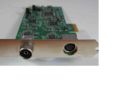DViCO FusionHDTV DVB-T Dual Express: Difference between revisions
Jump to navigation
Jump to search
| Line 71: | Line 71: | ||
====Experimental Driver Test Results==== |
====Experimental Driver Test Results==== |
||
*Successful tuning of 1080i channel on Asus P5K Mobo, CentOS 5.0 with kernel upgrade to 2.6.23 and experimental driver http://www.itee.uq.edu.au/~chrisp/Linux-DVB/DVICO. Now testing IR operation. |
*Successful tuning of 1080i channel on Asus P5K Mobo, CentOS 5.0 with kernel upgrade to 2.6.23 and experimental driver http://www.itee.uq.edu.au/~chrisp/Linux-DVB/DVICO. Now testing IR operation. |
||
*Note: Apply [http://www.linuxtv.org/pipermail/linux-dvb/2008-May/026280.html this Patch] to the xc-test branch for making it work with standard xc3028 firmware (xc3028-v27.fw) - otherwise the card will not tune to non-Australian channels and frequencies (at the moment). |
|||
*Successful tuning to all German frequencies and vdr recording action with standard xc3028 firmware and patched driver. |
|||
===Sample kernel output=== |
===Sample kernel output=== |
||
Revision as of 23:53, 29 May 2008
A hybrid DVB-T PCIe card from DViCO.
It is not supported under Linux. However, experimental support for the DVB-T side is available (see below for details).
Overview/Features
Able to deliver one analogue channel and one digital channel simultaneously or 2 digital channels. High definition resolution is 1920 x 1080. Features a power switch pass-through to allow it to turn the host system on automatically.
Components Used
- 2 x Xceive 3008ACQ (tuner IC)
- 2 x Intel WJCE6353 (digital demodulator)
- Conexant CX23885 (A/V Decoder / PCIe bridge)
- Pericom P15C.... (switch)
- PIC16F73 (external audio adc ? -- its used as such on the Fusion5 RT (note- the PIC16F73 is currently unsupported under Linux, so audio from external analog sources (a/v inputs) will not work); or maybe its being used for remote control (although that might be natively handled by the cx23885)?; or maybe its being used in conjunction with RTC duty ?)
- some Atmel eeproms
- some others (RF switch)...
Text for components not legible in main image:
- Oscillators:
- X511 : 4.000000 KONY 0703
- X301 : 28.636360 KONY 0703
- X951,X901 : KONY 0716Y 20.480
- X701,X801 : 32.000 KDK 7D
- X511 : 4.000000 KONY 0703
- U501 : ANW S688H
- U231 : ABE 632
- U221,U411 : AXH704
Identification
04:00.0 0400: 14f1:8852 (rev 02)
Subsystem: 18ac:db78
Control: I/O- Mem+ BusMaster+ SpecCycle- MemWINV- VGASnoop- ParErr- Stepping- SERR- FastB2B-
Status: Cap+ 66MHz- UDF- FastB2B- ParErr- DEVSEL=fast >TAbort- <TAbort- <MAbort- >SERR- <PERR-
Latency: 0, Cache Line Size: 32 bytes
Interrupt: pin A routed to IRQ 18
Region 0: Memory at fe800000 (64-bit, non-prefetchable) [size=2M]
Capabilities: [40] Express Endpoint IRQ 0
Device: Supported: MaxPayload 128 bytes, PhantFunc 0, ExtTag-
Device: Latency L0s <64ns, L1 <1us
Device: AtnBtn- AtnInd- PwrInd-
Device: Errors: Correctable- Non-Fatal- Fatal- Unsupported-
Device: RlxdOrd+ ExtTag- PhantFunc- AuxPwr- NoSnoop+
Device: MaxPayload 128 bytes, MaxReadReq 512 bytes
Link: Supported Speed 2.5Gb/s, Width x1, ASPM L0s L1, Port 0
Link: Latency L0s <2us, L1 <4us
Link: ASPM Disabled RCB 64 bytes CommClk+ ExtSynch-
Link: Speed 2.5Gb/s, Width x1
Capabilities: [80] Power Management version 2
Flags: PMEClk- DSI+ D1+ D2+ AuxCurrent=0mA PME(D0+,D1+,D2+,D3hot+,D3cold-)
Status: D0 PME-Enable- DSel=0 DScale=0 PME-
Capabilities: [90] Vital Product Data
Capabilities: [a0] Message Signalled Interrupts: 64bit+ Queue=0/0 Enable-
Address: 0000000000000000 Data: 0000
Other images
Making it Work
Firmware
Drivers
There is currently no in kernel drivers for the device. However, the card's digital functionality is supported in a test tree available here: http://www.itee.uq.edu.au/~chrisp/Linux-DVB/DVICO/
Experimental Driver Test Results
- Successful tuning of 1080i channel on Asus P5K Mobo, CentOS 5.0 with kernel upgrade to 2.6.23 and experimental driver http://www.itee.uq.edu.au/~chrisp/Linux-DVB/DVICO. Now testing IR operation.
- Note: Apply this Patch to the xc-test branch for making it work with standard xc3028 firmware (xc3028-v27.fw) - otherwise the card will not tune to non-Australian channels and frequencies (at the moment).
- Successful tuning to all German frequencies and vdr recording action with standard xc3028 firmware and patched driver.
Sample kernel output
cx23885 driver version 0.0.1 loaded sd 1:0:0:0: Attached scsi generic sg0 type 0 ACPI: PCI Interrupt 0000:04:00.0[A] -> GSI 18 (level, low) -> IRQ 18 CORE cx23885[0]: subsystem: 18ac:db78, board: DViCO FusionHDTV DVB-T Dual Express [card=5,autodetected] cx23885[0]: i2c bus 0 registered cx23885[0]: i2c bus 1 registered cx23885[0]: i2c bus 2 registered input: i2c IR (FusionHDTV) as /class/input/input4 ir-kbd-i2c: i2c IR (FusionHDTV) detected at i2c-1/1-006b/ir0 [cx23885[0]] cx23885[0]: cx23885 based dvb card xc2028 1-0061: type set to XCeive xc2028/xc3028 tuner DVB: registering new adapter (cx23885[0]) DVB: registering frontend 0 (Zarlink ZL10353 DVB-T)... cx23885[0]: cx23885 based dvb card xc2028 2-0061: type set to XCeive xc2028/xc3028 tuner DVB: registering new adapter (cx23885[0]) DVB: registering frontend 1 (Zarlink ZL10353 DVB-T)... cx23885[0]/0: found at 0000:04:00.0, rev: 2, irq: 18, latency: 0, mmio: 0xfe800000 PCI: Setting latency timer of device 0000:04:00.0 to 64




